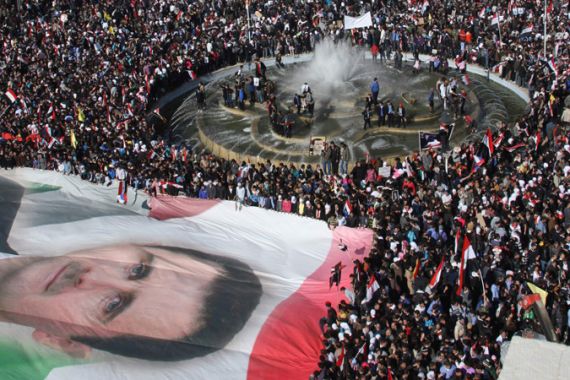Syria calls Arab sanctions ‘economic war’
Foreign minister slams Arab League’s decision to impose sanctions as thousands rally against move in several cities.

Syria’s Foreign Minister Walid al-Muallem has dismissed the Arab League’s economic sanctions against his country, saying the decision to halt dealings with the Syria’s central bank was a “declaration of economic war”.
Muallem told a televised news conference that Syria had already withdrawn 95 per cent of funds targeted by the league’s decision that Arab states freeze Syrian government bank assets.
Syrian state television showed tens of thousands of people protesting against the sanctions in the capital Damascus and the second city of Aleppo.
There were also demonstrations in the eastern cities of Deir al-Zor and Hassake, state media reported.
“Sanctions are a two-way street. I am not warning here, but we will defend the interests of our people … We have to defend the interests of our people,” he said on Monday.
The Arab League approved the sanctions against Syria on Sunday, in an attempt to isolate President Bashar al-Assad’s government over its violent response to an uprising which the UN says has killed at least 3,500 people since March.
The Syrian government blames the violence on “armed gangs”.
“The Arabs don’t want to admit the presence in Syria of groups of armed terrorists who are committing these crimes, abductions and attacks on public places,” Muallem said.
The European Union said the sanctions were a further “reaction to the regime’s brutality and unwillingness to change
course,” while the UK said the sanctions could help enlist support at the UN for action against Damascus.
The measures include halting Arab government funding for projects in Syria, a stop to trade exchange with the Syrian government, and a travel ban on Syrian officials.
Iraq had abstained from the vote, and refused to implement it, while Lebanon “disassociated itself” from the decision.
Invitation still open
“Today is a sad day for me, because we still hope our brothers in Syria will sign the document of the protocol and stop the killings, and to release the detainees and withdraw its military from Syrian districts,” Sheikh Hamad bin Jassim Al Thani said after the league’s decision.
“We are trying to prevent any foreign intervention into Syria.”
The Arab League had set a Friday deadline for Syria to allow rights monitors into the country and withdraw tanks from the streets or face sanctions, but the ultimatum drew no firm commitment from Syrian officials.
Nabil el-Araby, the league’s secretary-general, said the sanctions would be reconsidered if Syria met those demands.
“We call on Syria to quickly approve the Arab initiative,” he said.
Turkey, which attended the Arab League meeting as an observer, said it would act in accordance with the bloc’s sanctions.
According to Syria’s bureau of statistics, 52.5 per cent of all Syrian exports went to Arab countries in 2009, while 16.4 per cent of imports came from Arab nations.
Iraq tops the list of importers, buying up 31.4 per cent of outgoing Syrian goods.
The impact of the Arab sanctions is expected to be severe for Syria, which already faces a raft of EU and US measures, even without Iraq or Lebanon’s participation.
‘Crimes against humanity’
The EU will tighten sanctions against Syria’s oil and financial sectors this week, diplomats said on Monday.
EU foreign ministers meeting on Thursday will adopt a raft of sanctions including bans on exporting gas and oil industry equipment to Syria, trading Syrian government bonds and selling software that could be used to monitor internet and telephone communications, a European diplomat told the AFP news agency.
Meanwhile, a UN probe reported that Syrian troops had killed hundreds of children and committed other “crimes against humanity” since unrest began in March.
|
|
At least 256 children had been killed by government forces as of early November, with some boys sexually tortured, the panel said in its report to the UN Human Rights Council.
It said government forces had used excessive force, shooting “indiscriminately at unarmed protesters”.
Violence continued on Monday, with activists saying 19 people were killed across the country.
Assad has announced a number of reforms since the uprising began, such as lifting the country’s emergency law and drafting a new party law. However, the oppositions say the changes are not enough and that the president is not serious about implementing change.
Addressing a long-standing demand of protesters, Muallem said on Monday that Syria plans to drop a constitutional clause which designates Assad’s Baath Party as the leader of “state and society”.
Muallem said he was told by the head of a committee tasked with reforming the constitution that a revised version “includes multi-party [politics], and there is no place for discrimination between parties, meaning there is no Article Eight.”